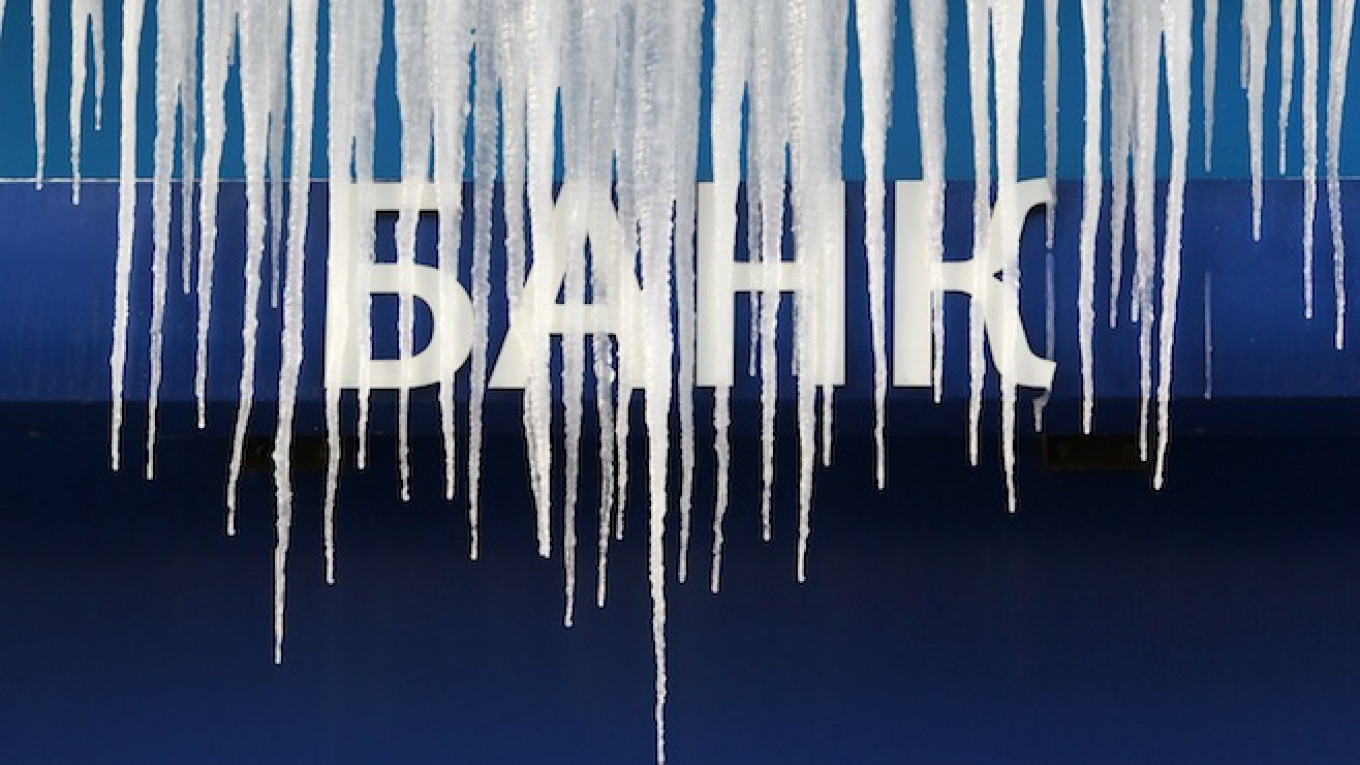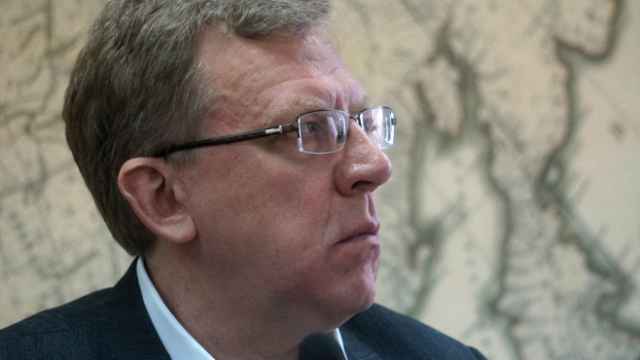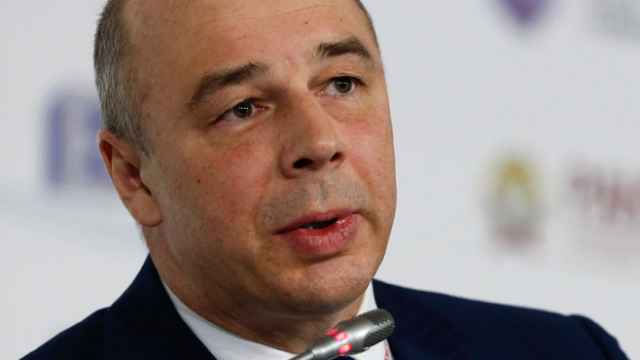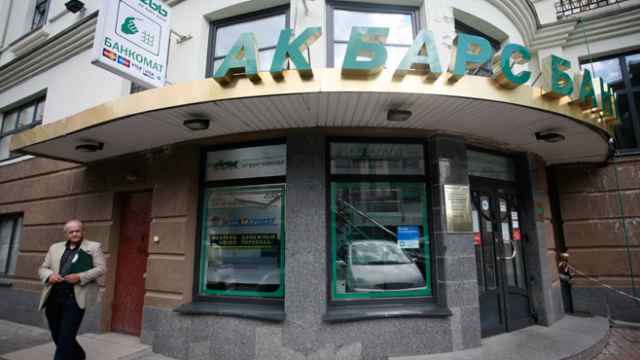Looming debt repayments by Russian companies are now central to discussions of Russia's ability to weather the financial shocks caused by low oil prices and Western sanctions, but the picture is more complex than commonly believed.
Despite last week's agreement aimed at ending the war in Ukraine, the sanctions are expected to remain for the foreseeable future, perhaps for years if the Ukraine deal fails to lead to a durable peace, leaving Russian companies largely cut off from Western financing.
As long as Western banks refuse to lend, many analysts assume the state will need to help companies repay their $550 billion in foreign debts. The whole debt burden "has to all intents and purposes been transferred to the national balance sheet," analysts at London consultancy Trusted Sources said in a recent report.
Pessimists therefore worry that even Russia's $375 billion in Central Bank foreign exchange reserves will eventually run out. At the very least, sizable foreign debt repayments add to the strain on the balance of payments, weighing on the ruble.
But other analysts say these fears are overblown: The debt burden may be far less than it appears on paper, and companies also have huge assets that can help shoulder the burden.
Heavy Burden?
According to Central Bank data, Russian companies and banks need to repay $109 billion in foreign debt in 2015, a heavy burden at a time when low oil prices have sunk export earnings and Western sanctions have stemmed capital inflows.
These sanctions are widely believed to prevent companies from refinancing foreign debts by taking out new foreign loans. But official figures tell a surprisingly different story.
Last year, net private sector debt repayments amounted to about $40 billion, or less than half of the $100 billion which the Central Bank said fell due, or implying the rest was refinanced or rescheduled.
Even in the fourth quarter, after Western sanctions were tightened, the size of net redemptions was only around half of debts falling due.
That suggests that many "foreign" debts are really debts to fellow Russians operating from offshore.
"Some part of the debt, around 40-50 percent, was related to recycling of Russian capital: money originally flowing away from Russia and then coming back as loans," said Alfa Bank economist Natalia Orlova.
This bullish view is backed-up by bottom-up analysis of the how much major companies owe to Western creditors. Data compiled by VTB Capital showed that the 15 biggest debtors had to repay only $45 billion in syndicated loans and Eurobonds this year, and $38 billion next year.
Not everyone is so optimistic. Credit Suisse economist Alexei Pogorelov said that even debts to Russians need to be repaid, though they may be easier to reschedule.
"The truth is probably in the middle," he said, estimating the real repayments required this year at $70-80 billion, between optimistic estimates and the official figures.
A further complication will be the impact if Russia loses its investment grade rating from a second major rating agency, following its downgrade to "junk" status by S&P in January.
By triggering early redemption clauses, a second downgrade could add $20-30 billion in debt redemptions this year, analysts estimate.
Overlooked Assets
While Russian companies' large foreign debts are widely discussed, their even larger foreign assets, worth almost a trillion dollars as of October, are often overlooked.
Many of these assets are foreign direct investments and loans, which may not be easy to liquidate to cover debts. But they also included more than $220 billion in cash, deposits and portfolio investments, Central Bank data shows.
The two largest debtors, the state energy companies, Rosneft and Gazprom, are alone believed to be sitting on tens of billions of dollars.
As of Sept. 30, their published accounts show, Gazprom held the equivalent of $19 billion in cash and short-term deposits. Rosneft had $16.4 billion in cash and deposits, mostly in dollars.
In an October report, ratings agency Moody's estimated that companies it rated had $160 billion in cash reserves and committed credit lines.
"As of June 2014 the bulk of our rated companies had sufficient liquidity to service their debt through the end of 2015," said Moody's analyst Artem Frolov. "Overall we would expect that those corporates that had liquidity funds in foreign currency would continue to hold them."
But just because some companies have ample foreign currency assets, it doesn't follow that they will use them to repay debts, said Pogorelov from Credit Suisse.
They may instead prefer to hoard their foreign currency and convert rubles instead, with negative implications for capital outflows and the ruble.
"The risk is that going forward you might be cut off from international financing for an extended period of time, which means that any foreign assets you have right now, you cannot waste," he said.
And the focus on the debt repayment issue may ultimately be missing the point.
Last year, reductions in foreign liabilities accounted for only a third of net capital outflows that totaled a record $151.5 billion, with demand for foreign currency cash and foreign direct investments covering most of the rest.
Bolstering public confidence in the ruble, and stemming chronic capital flight, may therefore be bigger challenges for Russia than helping companies repay their debts.
"We do not find this [foreign debt] issue to be acute," Alfa Bank analysts said in a recent report. "Still, capital account weakness transcends the foreign debt issue."
A Message from The Moscow Times:
Dear readers,
We are facing unprecedented challenges. Russia's Prosecutor General's Office has designated The Moscow Times as an "undesirable" organization, criminalizing our work and putting our staff at risk of prosecution. This follows our earlier unjust labeling as a "foreign agent."
These actions are direct attempts to silence independent journalism in Russia. The authorities claim our work "discredits the decisions of the Russian leadership." We see things differently: we strive to provide accurate, unbiased reporting on Russia.
We, the journalists of The Moscow Times, refuse to be silenced. But to continue our work, we need your help.
Your support, no matter how small, makes a world of difference. If you can, please support us monthly starting from just $2. It's quick to set up, and every contribution makes a significant impact.
By supporting The Moscow Times, you're defending open, independent journalism in the face of repression. Thank you for standing with us.
Remind me later.






